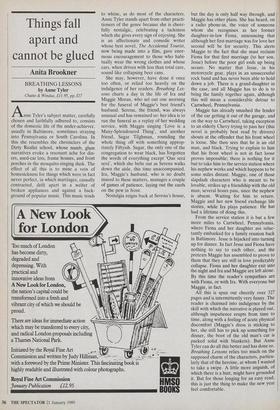Things fall apart and cannot be glued
Anita Brookner
BREATHING LESSONS by Anne Tyler
Chatto & Windus, £11.95, pp,327
Anne Tyler's subject matter, carefully chosen and faithfully adhered to, consists of the domestic life of the under-achiever, usually in Baltimore, sometimes straying into Pennsylvania or South Carolina. In this she resembles the chroniclers of the Dirty Realist school, whose numb, glum narratives evoke a resonant ache for din- ers, used-car lots, frame houses, and front porches in the mosquito-zinging dusk. The effect of all this is to mine a vein of homesickness for things which were in fact never perfect, in which marriages, casually contracted, drift apart in a welter of broken appliances and against a back- ground of popular music. This music tends to whine, as do most of the characters. Anne Tyler stands apart from other practi- tioners of the genre because she is cheer- fully nostalgic, celebrating a tackiness which she gives every sign of enjoying. She is an affectionate and comedic writer whose best novel, The Accidental Tourist, now being made into a film, gave enor- mous encouragement to those who habi- tually wear the wrong clothes and whose cars, when driven with less than total care, sound like collapsing beer cans.
She may, however, have done it once too often, or relied too heavily on the indulgence of her readers. Breathing Les- sons charts a day in the life of Ira and Maggie Moran, who set out one morning for the funeral of Maggie's best friend's husband. Serena, the friend, was always unusual and has remained so: her idea is to run the funeral as a replay of her wedding service, with Maggie singing 'Love is a Many-Splendoured Thing', and another friend, Sugar Tilghman, rounding the whole thing off with something approp- riately Fiftyish. Sugar, the only one of the congregation to wear black, has forgotten the words of everything except `Que sera sera', which she belts out as Serena walks down the aisle, this time unaccompanied. Ira, Maggie's husband, who is no doubt inured to these matters, manages a couple of games of patience, laying out the cards on the pew in front.
Nostalgia reigns back at Serena's house, but the day is only half way through, and Maggie has other plans. She has heard, on a radio phone-in, the voice of someone whom she recognises as her former daughter-in-law Fiona, announcing that although her first marriage was for love her second will be for security. This alerts Maggie to the fact that she must reclaim Fiona for that first marriage (to her son, Jesse) before the poor girl ends up being secure. No matter that Jesse, in his motorcycle gear, plays in an unsuccessful rock band and has never been able to hold down a job. There is a grand-daughter in the case, and all Maggie has to do is to bring the family together again, although this will mean a considerable detour to Cartwheel, Pennsylvania.
Maggie has already smashed the fender of the car getting it out of the garage, and on the way to Cartwheel, taking exception to an elderly Chevy trying to pass her (this novel is probably best read by drivers) shouts at the offender that his front wheel is loose. She then sees that he is an old man, and black. Trying to explain to him that his front wheel is not in fact loose proves impossible; there is nothing for it but to take him to the service station where his nephew works and which happens to be some miles distant. Maggie, one of those slapdash characters who is meant to be lovable, strikes up a friendship with the old man; several hours pass, since the nephew is absent. Waiting for him to return, Maggie and her new friend exchange life stories, while Ira plays patience. He has had a lifetime of doing this.
From the service station it is but a few more miles to Cartwheel, Pennsylvania, where Fiona and her daughter are reluc- tantly embarked for a family reunion back in Baltimore. Jesse is hijacked into turning up for dinner. In fact Jesse and Fiona have nothing to say to each other, and the pretexts Maggie has assembled to prove to them that they are still in love predictably collapse. Fiona and her daughter exit into the night and Ira and Maggie are left alone. By this time the reader's sympathies are with Fiona, or with Ira. With everyone but Maggie, in fact.
All this is spun out cheerily over 327 pages and is intermittently very funny. The reader is charmed into indulgence by the skill with which the narrative is played out, although impatience erupts from time to time, along with a feeling of acute physical discomfort (Maggie's dress is sticking to her, she still has to pick up something for dinner, the boot of the old man's car is packed solid with blankets). But Anne Tyler can do all this better and has done so. Breathing Lessons relies too much on the supposed charm of the characters, particu- larly that of the heroine, at whom I wanted to take a swipe. A little more anguish, of which there is a hint, might have grounded it. But for those longing for an easy read, this is just the thing to make the new year feel comfortable.


























































 Previous page
Previous page